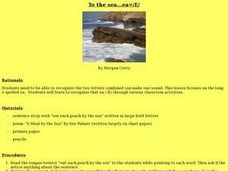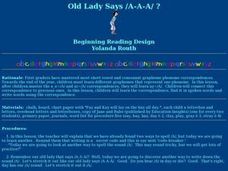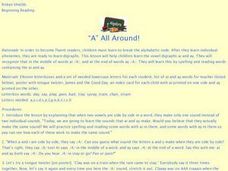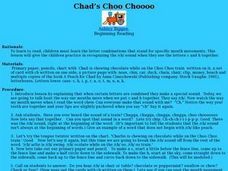Curated OER
Bee a Reader
Use a fun tongue twister to help your class remember the /ee/ sound! With this activity, they distinguish between the sounds for short vowel e and long vowel e. They are introduced to the vowel patterns that comprise long vowel sounds,...
Curated OER
To the Sea
Improve pronunciation and phonemic awareness in your first and second graders! With this plan, they distinguish between the sounds for short vowel e and long vowel e. They are introduced to the vowel patterns that comprise long vowel...
Curated OER
I Scream You Scream We All Scream for Ice Cream!
Use letter boxes and example words to help kids distinguish between the sounds for short vowel e and long vowel e. They are introduced to the vowel patterns that comprise long vowel sounds, with a particular emphasis on /ea/. They...
Curated OER
How Many Feet Will We Meet?
Emerging speakers distinguish between the sounds for short vowel /e/ and long vowel /e/. They are introduced to the vowel patterns that comprise the long vowel sounds, with emphasis on /ee/. They practice reading and spelling a variety...
Curated OER
Peachy Teacup by the Stream
Help your kids distinguish between the sounds for short vowel /e/ and long vowel /e/. They are introduced to the vowel patterns that comprise long vowel sounds, with a particular emphasis on /ea/. They practice reading and spelling a...
Curated OER
Old Ladies Say A?
The letter a produces so many sounds! Increase your class's awareness of concepts related to reading and spelling. They identify the digraphs /ea/ and /ai/ in spoken language and spelling as a long vowel sound. After a brief discussion,...
Curated OER
"A" All Around
Spell and read words containing ai and ay. First and second graders identify vowel digraphs in written and spoken language. After a brief discussion on the combinations of letters that comprise digraphs, they practice reading and...
Curated OER
Pronunciation: The Sounds /s/, /z/ or, /iz/? Consonant Clusters with "s"
Instruct your class on how to pronounce /s/ sounds with this resource. Learners fill in the final /s/ sound into blanks, listen to plural sounds, learn about the rules of the target sound, write sentences, and work with consonant...
Curated OER
Phonemic Awareness: Blending
First graders listen closely as their teacher sounds out a variety of words, one phoneme at a time. They then practice blending sounds to create words on their own. Tip: While you sound out words have your class write down each phoneme...
Curated OER
Phonemic Awareness: Segmenting
You ever feel like your going in circles? Because this lesson seems very much like others I've seen. First graders put up a finger as they count each phoneme the teacher emphasises as she says a series of words.
Curated OER
Phonics: Segmenting Words with two or three phonemes
Kindergarteners build phonemic awareness by segmenting words with two or three phonemes. As the teacher says each word, the kids put up a finger for each phoneme they hear. This can also be done with manipulative such as blocks or tally...
Curated OER
Phonics: Decode and Write Words
Sounding out individual phonemes and blending them to make a word is usually one of the first tasks mastered when learning to read. Make master decoders out of your learners, they sound out a series of simple two and three-letter cvc...
Curated OER
Phonemic Awareness: Syllables
Count the syllables in your name, now count the syllables in your friend's name. Kids count syllables as they clap out and segment words. This activity is done as a whole class and has the potential of being highly engaging. The engaging...
Curated OER
Phonemic Awareness: Phoneme Blending
This resource is more of a suggestion than a full lesson. It explains how young pre-readers can work with their teacher to practice blending phonemes to make words. The class watches the teacher as she says and orally segments a word...
Curated OER
The -igh Sound
This presentation asks what flight, light, and fight all have in common. They all have the -igh sound or spelling pattern. Other words with the -igh sound such as fine, fly, and bite are shown because they use different letters to make...
Curated OER
Alphabet Letters M, N, and O
Here is a classic activity focused on developing letter recognition and phonemic awareness. Learners will circle the beginning letter for each of nine words. The letters showcased on this page are M, N, and O.
Curated OER
Final Consonant Sounds: Review - ft, ld, lt, mp, nd
These are challenging phonics review sheets. On the first page, learners match the end sounds to the pictures and write a rhyming word for each word. For the second page, pupils choose an end sound to complete a series of incomplete...
Curated OER
Everybody Get Ready
Learners identify and spell words containing the short /e/ sound. They rehearse a fun tongue twister which contains words emphasizing the short /e/ sound. They then read Red Gets Fed as a class. Have your group clap every time they hear...
Curated OER
Beginning and Ending Consonants
Young readers explore consonant sounds. In this beginning phonics lesson, learners fill in a beginning/middle/end vertical column chart with the sounds they hear in the pictured object. Practice spelling CVC words.
Curated OER
Saxon Phonics: Kindergarten
Here is an interesting twist on the old spelling test. Kindergartners will enjoy the sounds and animation that accompany the images which represent the words they must identify and spell. Note: While some of these words would be more...
Curated OER
I Can Make New Words
A fun rhyming song written out on these slides help learners comprehend what word families consist of in order to make their own new words! For example, they first see tan, can, fan, and ran with the initial different letters in a...
Curated OER
The Creaky Door Says "ehhhh"
Study the long vowel sound /e/, as in a creaky door noise. Children repeat the sound and learn a chant. They use letters in letterboxes to make words with the /e/ sound before reading a book and writing a message about their favorite...
Curated OER
Shhh! Be Quiet
Teach the digraph sh with your learners. First, model the sound the digraph makes. Then, have learners spell a variety of words that use the target sound. Finally, read Shoe Man, where learners can hear the words in context.
Curated OER
Chad's Choo Choooo
Choo, choo! Do your youngsters like trains? After studying the target sound, have your learners read A Peach for Chad. Do a class read and an independent read to increase fluency. At the lesson's close, consider creating a ch train where...

























